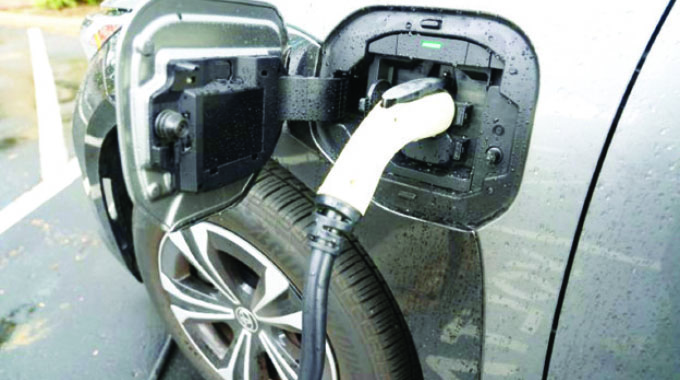SA auto industry to award tender for EV charging stations

South Africa’s automotive industry plans to issue a tender worth hundreds of millions of rands by the end of June for the rollout of electric vehicle (EV) charging infrastructure across the country.
The National Association of Automobile Manufacturers of South Africa (Naamsa) is driving the project on behalf of locally based original equipment manufacturers (OEMs) and vehicle importers and distributors.
Naamsa CEO Mikel Mabasa said on Tuesday that the tender submission deadline closed in March and the target date to announce the successful bidders is the end of June. He said a decision has not yet been taken on whether the tender will be awarded to a single bidder or more than one.
“We are still looking at the quality, capability and experience of those who responded to the tender,” he said.
Countrywide capacity
“But it will be preferable to have more than one [contractor] because of the size of what we want to do … and the deployment [of charging infrastructure] is not hampered by any incapacity of the successful bidder to roll it out,” he said.
Mabasa said Naamsa received bids from four local and five international companies and all nine are experienced and already in the business in some shape or form.
He said the project involves rolling out charging infrastructure on the national road network across the length and breadth of South Africa.
It will include deploying charging infrastructure on the N1 from Musina to Cape Town, the N2 from Cape Town to Richards Bay in KwaZulu-Natal, the N3 and N4, and other national routes.
“We want the deployment of fast charging infrastructure on these routes because we have seen an increase of electric vehicles coming into the country and many of the OEMs are making their investments for their own charging infrastructure,” Mabasa said.
“So we have taken a decision that instead of each and every company investing in their own infrastructure, let’s put all our resources into one basket and to make sure that we set up charging stations that are available to everyone.”
New energy car sales rise
The project is being driven by SA auto industry forecasts for EV and new energy vehicle (NEV) sales. Mabasa said the NEV parc is currently less than 1 percent of the total car parc in the country.
However, Mabasa said NEV sales in South Africa grew year-on-year by 431 percent in 2022, mainly driven by hybrid vehicle sales, particularly the hybrid Toyota Cross that is being manufactured by Toyota in Prospecton, Durban.
“We see this continuing this year and also know there are new brands that are coming into the market with NEVs, particularly battery electric vehicles,” Mabasa said.
“We don’t think the vehicle parc will increase significantly [in 2023] but the growth of NEVs will still be around the same as we saw last year – so around a 400 percent to 500 percent increase compared to the previous year.”
Mabasa added that the International Organisation for Automobile Manufacturers has estimated that global sales of NEVs, particularly EVs, will increase to 40 million in 2023 and its share of total vehicle sales will grow to 18 percent.
Privately operated charging points
Global automotive research leader at Deloitte Ryan Robinson said during a webinar focused on the Deloitte 2023 South African Automotive Consumer Study last week that one of the biggest concerns among consumers, keeping them away from thinking about an EV, is “definitely connected to the lack of charging infrastructure”.
He added that SA differentiates itself from many of the other markets in the world, particularly markets like China, Europe and the US, in that three out of four consumers “are still married to the idea of petrol powered vehicles” as opposed to a NEV.
However, Robinson said that on a year-on-year basis there is a move away from ICE vehicles to EVs. More than 350 EV charging points are currently operated across South Africa by GridCars — one of the major players in this space in the local market — that became part of JSE-listed Alviva Holdings in 2017.
Mabasa said all the investment in South Africa in charging infrastructure has been paid for directly by the OEMs while in other markets, such as China, Dubai and the UK, governments have invested to support the industry to introduce the charging infrastructure.
Industry moves forward
He said South African based vehicle producers and OEMs have taken a leap of faith and taken a decision themselves to bring NEVs into the country and produce those vehicles locally despite the absence of government policy on the transformation of the industry to NEVs from internal combustion engine (ICE) vehicles.
Mabasa confirmed the charging infrastructure project will be partly funded by the Automotive Industry Transformation Fund (AITF), created by the industry to support key capital intensive projects.
“So not all the funding is necessarily going to come from the OEMs directly and we are obviously working with the AITF,” he said.
“We are also going to bring in some of the local companies to partner with some of these experienced international firms to advance our transformation and empowerment agenda as a country by making sure that small black-owned companies are able to also get an opportunity for skills transfer and skills development.
“As we accelerate the transition into NEVs, there will also be black companies that can . . . take their place and begin to play in that space,” he said. — Moneyweb











Comments